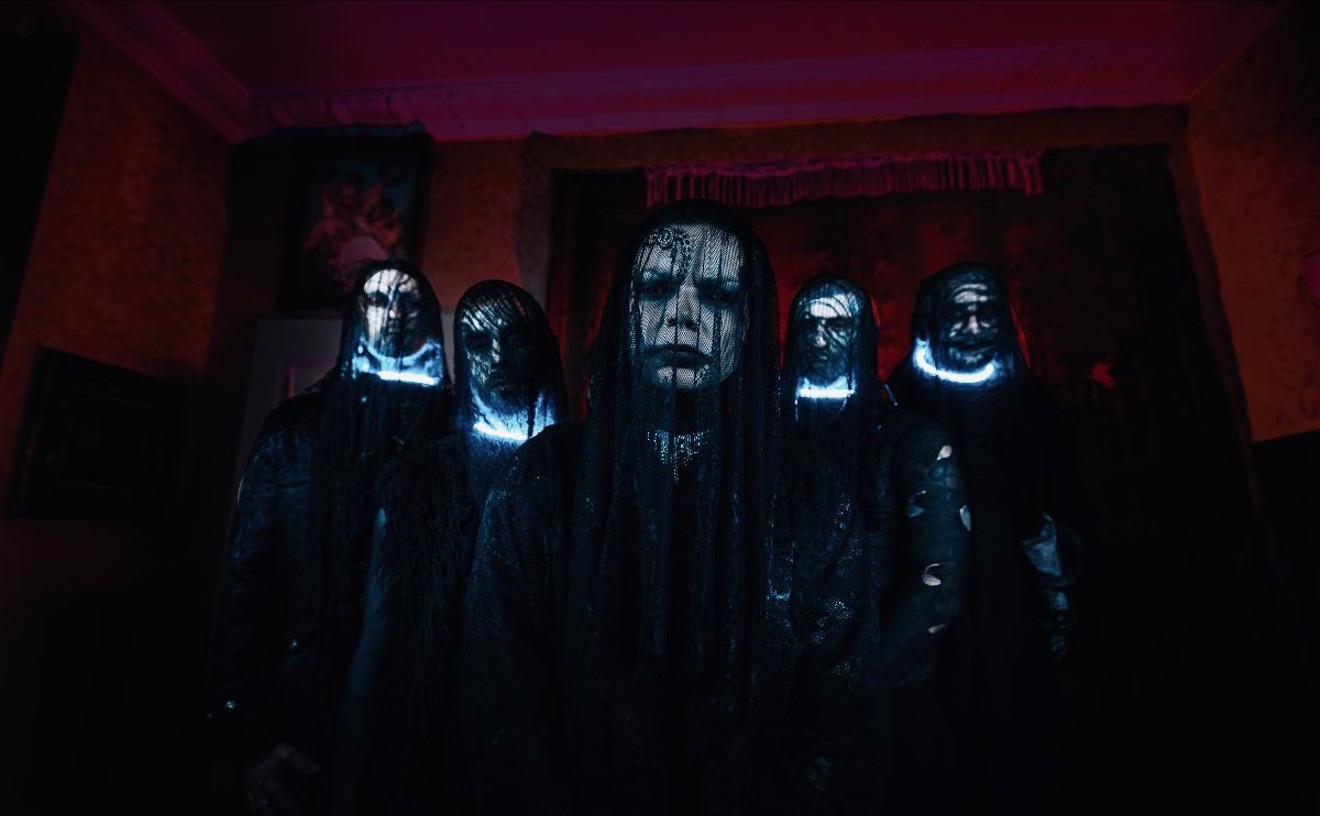In fact, over forty different musicians have passed through the Massacre's ranks since its inception in 1990 -- including members of the Warlocks, Black Rebel Motorcycle Club and the Dandy Warhols, whose Courtney Taylor is featured alongside Newcombe in Dig!, a documentary that just took the grand-jury prize at Sundance. The current six-man lineup (subject to change without notice) features Newcombe, Ricky Maymi and Frankie Teardrop on guitars, Zy Lyn on violin, Colin Hegna on bass and Ryan Sumner on drums. And though the BJM has been something of a musical cornerstone for the incestuous Haight-Ashbury district of San Francisco, its own hazy, neo-psychedelic sound has evolved well beyond the antics of one unpredictable frontman, a self-described "psychic worm" who claims to hear "orchestrally," reads voraciously, pushes friendships to the limit and, at the age of 36, seems a likely enough candidate for a savior complex.
Traveling by van with his disciples somewhere outside of Tallahassee, Florida, Newcombe comes across as blunt and tangent-prone through a cell-phone signal that, fittingly enough, fades in and out. The middle child born to a middle-class family in SoCal's Newport Beach (his father was a career Navy man), the erratic rocker chatters as much about pop celebrity and politics as he does about his own music. When the conversation turns to heroes, a recurring theme throughout a body of work that spans nine albums, Newcombe, a reformed heroin addict, has the green light to rant -- and he's racing.
"If people want to talk shit about me fighting, drinking, doing drugs, whatever, I don't give a shit," Newcombe says. "Because look at my nation's heroes! Look at the covers of fuckin' Walt-Disney-owned Rolling Stone. There's Justin Timberlake, Britney Spears, Jessica Simpson. I don't care if I'm not in the paper because I don't know that Chicken of the Sea isn't chicken. They're all Mouseketeers. What the fuck is goin' on in our country? Look at our economy. Nobody lives like that -- except crooks, you know.
"Or Paris Hilton," he continues. "Don't you think that if you were a fucking millionaire-heiress teenager, that if you're gonna make a porno, you could have made a higher-quality one? What a joke! What a loser! She's still on Fox, so you can literally have some big pigs fucking the shit out of you all over the Internet and still be on TV!
"Those aren't my heroes," Newcombe continues. "But people need heroes more than ever now because we're so far removed from a natural-type existence. We've got Doppler radar to warn that the tornado is coming. And you've got insurance to help rebuild your house, and you'll hire Mexicans to do the work for you. You know it's not really an Amish situation, where your house blows down, and if you're not killed, everyone in your community's helping each other. But the bottom line is, people need heroes to live vicariously because they need to insulate and protect themselves from reality. Because most people don't have the necessary courage of their convictions to stand up and get out in the elements and accomplish something."
Who, then, in Newcombe's estimation, deserves any laurels?
"I think Johnny Cash was a hero," he asserts. "He had his ups and downs, but he continued to do what he was doing until the day he died and held on to his spiritual beliefs and was a family man. Chuck D's most definitely a hero. He's maintained his integrity when he had all the resources in the world in popularity and the public pulpit. I don't think he's that interested in the business to prostitute himself endlessly. You can't say that about everybody. Look at Rick Rubin: He talked a dying Johnny Cash into filming a video in a shut-down museum to another crappy Trent Reznor song about a kingdom of filth or whatever. It's like draggin' an old man through the muck."
Not afraid to wallow in his own mire, Newcombe certainly gravitates toward dark subject matter -- best demonstrated, perhaps, by the ominous wordplay in the name of his band. Fusing together the (arguably) first martyr of rock and roll with a charismatic madman who led 914 people to their death in the steamy jungles of Guyana goes beyond mere cleverness. It perfectly encapsulates the hazardous link between transcendence and excess -- whether one's personal devotion leads to salvation through cyanide-laced Kool-Aid or to emulating the mystical catalyst behind some of the world's most beloved "devil music."
"Think of the multiple similarities between a cult leader and a rock-and-roll icon," Newcombe offers. "The perfect example of that is David Koresh, who evidently was trying to be both. You know, he's rockin' out, making tapes, sending them out. He kept making people play his songs on the radio, or he wasn't gonna negotiate with the FBI.
"I think his music really sucks," Newcombe adds.
The same can't be said about the singer's feelings for the early Rolling Stones, an obvious influence on the Massacre's sound. But rather than just reheating leftovers from the Summer of Love, BJM scours the gutters and beyond for aural sustenance.
"I always had a big fixation with the Velvet Underground early on," says Newcombe. "And punk music, exotic music. It all morphed into more than just a bunch of ingredients."
Broadening the scope of Newcombe's acid-gobbling forefathers to include the sonic roar of My Bloody Valentine sharing needles with Spacemen 3, Massacre released its debut, Methodrone, in 1995, followed a year later by the folksier, more complex textures of Their Satanic Majesties' Second Request. A first-rate oddity, the sophomore effort blends sitar, mellotron, tamboura, doumbek, tablas, didgeridoo, French horn and other curios into an exceptional, acoustic-guitar-driven long-player. So was Newcombe originally drawn to drugs for enlightenment or oblivion?
"All of it," he says. "When I was a little kid, I thought I had a pretty good handle on the world and people and how they manipulate one another. But I felt like I was in control. The thing I appreciated about hallucinogenics is that I felt absolutely out of control immediately -- like dynamite, or fast cars, or motorcycles, or anything. They can be fun or great -- get you around, whatever. But if you screw up, some things are really more dangerous. It was challenging to be exploring my own unfamiliar thoughts. That was a very therapeutic milestone in my development."
Maintaining a precarious chemical balance throughout the '90s, Newcombe issued several more affectingly woozy albums: 1996's Thank God for Mental Illness, Take It From the Man! and Spacegirl and Other Favorites; 1997's Give It Back; and his one and only leap from indie imprint Bomp! to the quasi-majors, Strung Out in Heaven, released in 1998 on TVT. Fairly restrained compared with earlier efforts, Heaven nonetheless rang in the same year that Newcombe finally kicked smack (while befriending the MC5's graying panther, Wayne Kramer, in rehab). A sour relationship with TVT soon followed, prompting Newcombe to tear up a four-record contract.
"They were in material breach of it, so I left," he says. "I'm sure they're glad I'm gone, too. It wasn't like I was gonna make 'em rich."
Newcombe started up his own imprint, The Committee to Keep Music Evil, as a result.
"I license out records to other people to sell for a number of years, then it reverts back to me," he explains, "instead of selling the masters to somebody who's always making money to the end of time and I get nothing to show for it."
Generous to a fault, Newcombe has made the Massacre's entire back catalogue available for free download on the band's Web site -- including the Peel sessions, several EPs, hours of live material and 2001's full-length, Bravery, Repetition & Noise. He views MP3s and file-sharing as a promotional tool rather than something criminal.
"There needs to be an Abraham Lincoln with an emancipation-of-recording-artists kind of thing," Newcombe states. "Everybody gets bought and sold: Take Meat Loaf, who sold 35 million copies of Bat Out of Hell and never made one penny off it. Can you believe that? The business is set up to screw you over."
Soldiering on in spite of the odds, Newcombe recorded ...And This Is Our Music over the course of two years and released it last October on Tee Pee Records. Emotionally weary, the album drifts through a somber landscape built around tuneful organ melodies, walls of acoustic guitar, overstylized background noise and downbeat vocals that recall Ray Davies. Guest musicians -- and there are plenty -- include Ed Harcourt, Kurt Heasley of the Lilys and Darren Rademaker of the Tyde. A crowning achievement in joyless psychedelia, the fifteen-song cycle draws inspiration from The Church ("A New Low in Getting High"), video artist Bill Viola ("The Pregnancy Test") and the highly symphonic Sergio Leone ("You Look Great When I'm Fucked Up").
"What makes it different is there's a lot of orchestration," Newcombe notes. "And the playlist is more cinematic; there's instrumental drum stuff. We really are a garage-rock band at heart, and since a lot of bands are doing that, I decided to go into areas that those bands don't really cover. I want people to listen to it and get a sense that they could do much better than me. I don't want it to be this illusion of perfection."
Considering what a fusspot Newcombe can be when he's chewing out bandmates or soundmen on stage, such an admission is surprising. Then again, the moody frontman embraces mistakes and chance as much as he obsesses over a single maraca track. But for all his loose, lo-fi experimentation, Newcombe seems mystified that critics constantly compare his music to that of Sir Jagger and company.
"It's complete laziness on their part," he says. "We're not rhythm-and-blues-based. That was the Stones' whole bit -- whether it's Mick Jagger trying to act like Tina Turner the whole time or Keith Richards playing Chuck Berry riffs."
Though he's never sent his music directly to either rock legend for an offhand appraisal, Newcombe believes that the two are at least aware of his project -- namely, through a certain Italian groupie who was Jones's ex-girlfriend and the mother of Richards's two children.
"I've got pictures of Anita Pallenberg wearing one of our T-shirts," Newcombe says. "But because of their status in the pantheon of history, you know, they're not gonna go talk about another band. They're just interested in their own legacy and not a pioneer like Brian Jones, obviously. When they were inducted into the Hall of Fame, they acknowledged his contribution, but not as the founder of the band. They acknowledged their roadie because he just passed away. So those guys are fuckers. Who cares?"
When asked if he has any interest in forming his own cult -- doomsday or otherwise -- Newcombe remains stoic. "No," he says flatly. "I mean, because I don't really have an agenda, you know? It's not enough to really want people around me in that context. I'm idealistic to the point that I've created my own cottage industry to support me and my friends. We do really well. We could travel anywhere. But I really don't know what the goal is with all this crap."
Self-sufficient, with a son in Los Angeles to raise, Newcombe plans to spend the rest of the winter touring the U.K. and Australia -- but customs officials needn't worry.
"I've already garnered whatever information I can from doing drugs," Newcombe says. "It's like time served. I'm beyond that now, you know, as an elder statesman of indie rock or whatever. But I don't have any prohibitions or taboos on it."
Does that mean Newcombe is committed to sobriety these days?
"No way, man," he says. "I get drunk as a skunk. But I have to work, you know? So it's really not necessary to be super fucked-up all the time."










